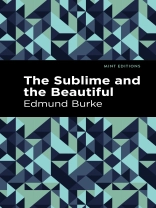A Philosophical Enquiry into the Origin of Our Ideas of the Sublime and Beautiful (1757) is a philosophical treatise published in pamphlet form by Irish statesman and thinker Edmund Burke. Following in the footsteps of generations of philosophers, especially Aristotle and Hume, Burke sought to describe the inherent difference between beauty and sublimity as emotional responses rooted in human perception. His work was incredibly influential for the growth of Romanticism in Europe and Britain especially, which sought to capture the sublime in both visual art, music, and literature.
Burke begins with a section on the senses in relation to human individuality and society in order to illuminate the collective nature of passions—for which we may read emotions—and to argue that the power of the arts is to shape and effect those emotions. In the second part, Burke observes the passions caused by the sublime, including terror, as well as records the effects of certain sensory perceptions—of sound, light, color, and smell—on creating sublime feelings in the mind. Part three follows the same trajectory but describes the beautiful instead before ultimately comparing the two, and part four attempts to ascertain their causes in nature. Burke concludes his treatise with a brief section on the sublime and beautiful in poetry, laying the groundwork for Romanticism’s use of language, among other things, to purposefully invoke feeling in the reader or observer.
This edition of Edmund Burke’s A Philosophical Enquiry into the Origin of Our Ideas of the Sublime and Beautiful is a classic of philosophy reimagined for modern readers.
Since our inception in 2020, Mint Editions has kept sustainability and innovation at the forefront of our mission. Each and every Mint Edition title gets a fresh, professionally typeset manuscript and a dazzling new cover, all while maintaining the integrity of the original book.
With thousands of titles in our collection, we aim to spotlight diverse public domain works to help them find modern audiences. Mint Editions celebrates a breadth of literary works, curated from both canonical and overlooked classics from writers around the globe.
عن المؤلف
Edmund Burke (1729-1797) was an Irish philosopher and member of parliament in the British House of Commons. The son of a Catholic mother and Anglican father, Burke was raised between Dublin and rural County Cork. In 1744, he began studying at Trinity College Dublin, where he founded a debating society and graduated in 1748. Burke traveled to London in 1750 to become a lawyer, but soon abandoned his legal studies in favor of a life of professional writing. His first work, A Vindication of Natural Society: A View of the Miseries and Evils Arising to Mankind (1756) was an ironic reworking of Lord Bolingbroke’s infamous arguments for reason over religion. This satire earned Burke the reputation of fearless firebrand and intellectual skeptic which would carry him throughout his career. His two most important publications, arguably, are A Philosophical Enquiry into the Origin of Our Ideas of the Sublime and Beautiful (1757) and Reflections on the Revolution in France (1790). Although a member of the historically liberal Whig Party, Burke is now frequently seen as a foundational figure in the development of modern conservative thought.












